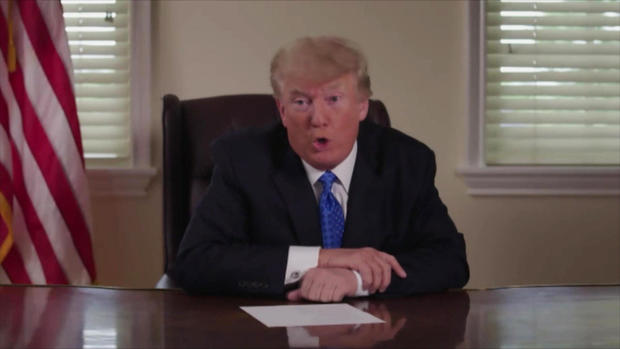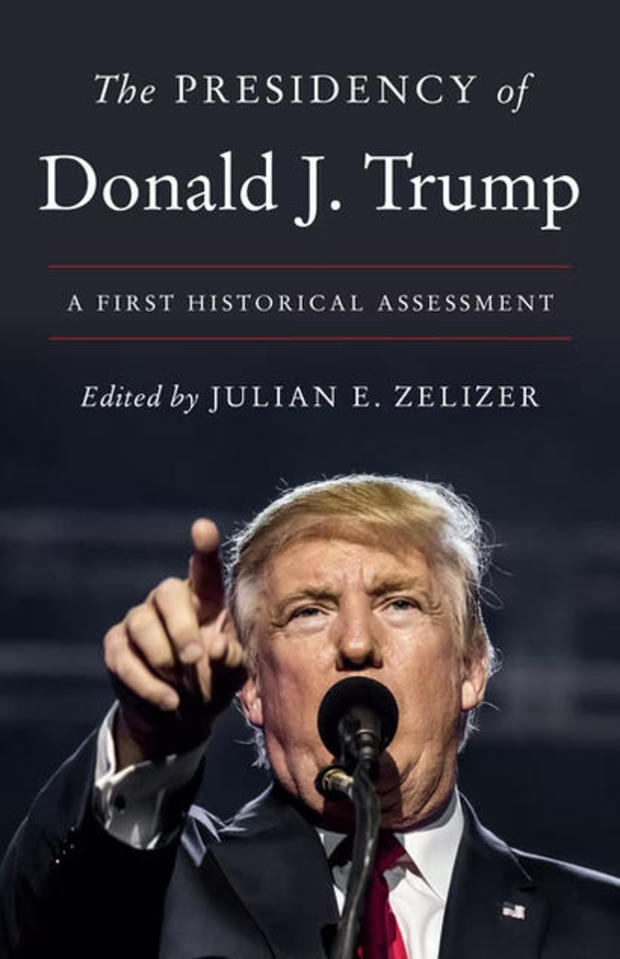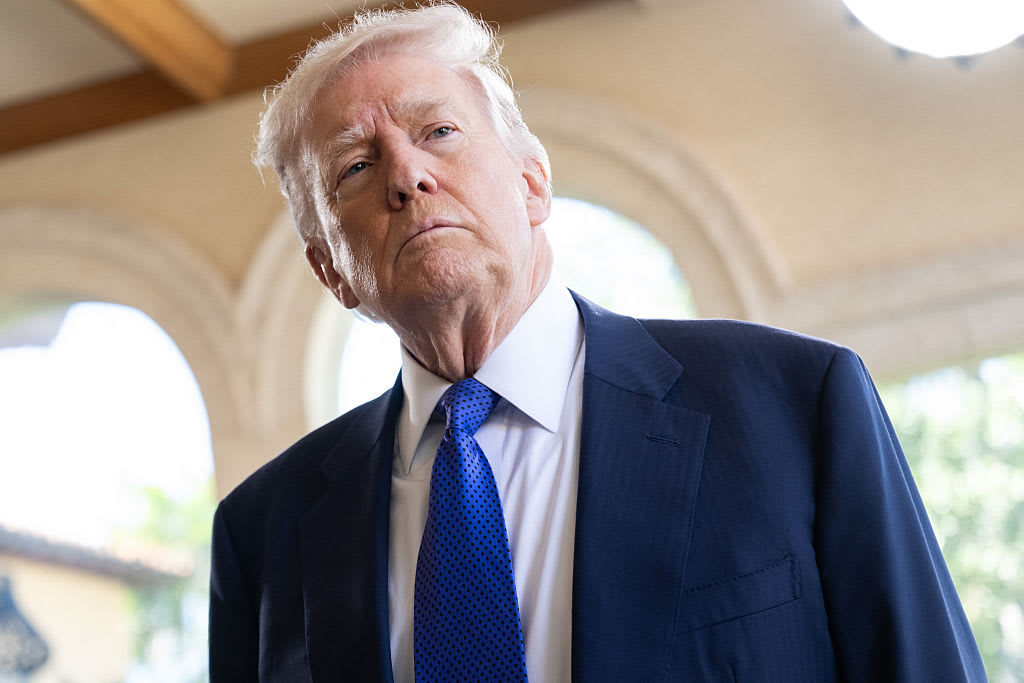How historians view Trump – and how Trump sees himself
There's at least one thing that Donald Trump's critics and supporters can agree on about his presidency, according to Jeffrey Engel, director of the Center for Presidential History at Southern Methodist University: "He came in to be a disrupter, and of all of his accomplishments, I think it's very easy to say that he accomplished that one."
Engel is one of a group of historians from leading universities around the country who convened via Zoom last March. Their mission: assessing one of the most unusual presidencies in American history.
During the call, Timothy Naftali of New York University remarked, "His concept of a national interest was identical with his concept of his own interest."
Daniel C. Kurtzer, of Princeton University's School of Public and International Affairs, said, "Trump inherited a mess. It was not that he created a mess; the Middle East was in very bad shape."
Julian Zelizer of Princeton assembled the panel, which will soon publish a book of essays on Mr. Trump's time in office – a presidency he described as "one of the most unstable, unconventional.
"One thing that historians who've lived through the moment have, that historians 200 years from now won't have, is a sense of what it felt like to live in the moment," Zelizer told correspondent Rita Braver.
It will be the third volume in a series which offered mixed assessments of Presidents George W. Bush and Barack Obama. But unlike his predecessors, former President Trump requested to meet via Zoom with the historians.
They shared a video of that July session with "Sunday Morning."
"I have great respect, and I thought of you writing a book, it would really be nice if we had an accurate book," Mr. Trump said.
Braver spoke with four of the historians on the panel, who all agree that history's judgement of President Trump is likely to focus on two major events: his response to the coronavirus pandemic (one he said was "going to disappear … one day, it's like a miracle it will disappear"), and his role in the insurrection at the U.S. Capitol (at which he told the assembled crowd, "We fight like hell, and if you don't fight like hell, you're not gonna have a country anymore").
- A timeline of what Trump has said on coronavirus
- Trump pushes baseless voter fraud claims at Georgia rally on eve of crucial Senate runoffs
- 6 conspiracy theories about the 2020 election – debunked
We'll get back to those in a moment. But first, during his one-hour session with the group, Mr. Trump focused on what he sees as his administration's major accomplishments, for example, generating a strong economy early in his term: "Prior to the pandemic we were setting records in every way," he said.
He touted his building of at least part of a wall between the U.S. and Mexico ("We did a great job on that, and we got, we did a very, we did the wall that Border Patrol wanted").
And he proudly talked of upending U.S. policy toward China: "China was very bad on trade, you know that I did tariffs and everything else and really had a big impact."
It's a policy shift that President Biden has continued.
Jeffrey Engel said, "Trump, I think, helped most Americans recognize that China needed to be stood up to."
- Trump administration steps up pressure on China with threat of more tariffs
- Fact check: Is Trump right that the U.S. loses $500 billion in trade to China?
- Trump says tariffs remain as he signs "Phase One" trade deal with China
And then there were Mr. Trump's three Supreme Court appointees, likely to tilt the Court to the right for decades.
But when it comes to the full assessment of the Trump Presidency, historians point out that his accomplishments were often eclipsed by behavior never before seen in a U.S. president.
He frequently commended himself ("I'm, like, a really smart guy"). And then there was his use of social media – firing people or announcing appointments via Twitter.
"Major policies were announced on Twitter, often causing real confusion and chaos," said Nicole Hemmer, of Columbia University. She also points to Mr. Trump's extensive record of making false claims, beginning when he insisted he had record-breaking crowds at his inauguration ("It looked, honestly, it looked like a million-and-a-half people!").
Hemmer said not all presidents tell the truth all the time, but this one had a singular strategy:
"It is about lying as a test of loyalty," she said. "Everyone can see that the crowd size is smaller. But if you are a Trump supporter, you will have to side with him. And that's a very different use of lies."
- Kellyanne Conway draws fire after "alternative facts" defense
- Sean Spicer says he regrets claim about Trump inauguration crowd
Previous presidents sought to unify the country: During a Fourth of July speech in 1986, President Ronald Reagan said, "Republican and Democrat, we are all Americans."
But the historians point out much of President Trump's rhetoric encouraged a divide: his people versus everybody else. Mr. Trump told a rally in North Dakota, "You work harder, but you are indeed smarter than them. Let's call ourselves, from now on, the super-elite. We're the super-elite."
Braver asked, "On the one hand, you had him speaking to people who legitimately felt like they'd been forgotten. And on the other hand, you had people say that he emboldened White nationalists and racists with this very same rhetoric. Which was it?"
"Oh, it was absolutely both," Hemmer replied. "That he was able to speak to people who didn't feel heard was true. But as somebody who studies White nationalist and White power movements, those movements also heard something in what Donald Trump was saying that appealed to them."
The historians say that connection with White nationalists was on display after they clashed with counter-protestors in Charlottesville, Virginia in 2017. Mr. Trump responding by saying there were "very fine people, on both sides."
Julian Zelizer said, "It was a march fueled by this White rage and White backlash, and the president was unable to firmly just announce it."
- White House defends Trump's reaction to Charlottesville
- Trump faces pressure to explicitly condemn White nationalists after Charlottesville
- Kaine says Trump's rhetoric "emboldens" white nationalists
Still, many voters were willing to overlook Mr. Trump's provocative behavior.
Then, COVID hit, and polls showed disapproval of his handling of a pandemic that has now killed more than 800,000 Americans.
From the very beginning, in January 2020, Mr. Trump said in a CNBC interview, "We have it totally under control. It's one person coming from China."
In his talk with the historians, the former president acknowledged no mistakes – instead lauding his own handling of the crisis: "And so, we got to work and we did an incredible job," Mr. Trump said. "We had to go buy from everybody all over the world, and it was tough because everybody else wanted to buy, too, the masks and all of it."
Braver asked Merlin Chowkwanyuan, a historian at Columbia University's School of Public Health, "How did Donald Trump do with answering the challenge of COVID?"
"Overall, I think Donald Trump not only didn't do bad, he did pretty terribly," Chowkwanyuan replied. "There were many opportunities where he could have taken decisive federal action, and [he] passed them up."
Chowkwanyuan said that despite Mr. Trump's claims, he failed the country in major ways, including "on the rhetorical stage, where a president gets to use the pulpit. He instead used it to flout scientific expertise."
As when Mr. Trump suggested treating COVID patients with disinfectant: "And then I see the disinfectant, where it knocks it out in a minute, one minute. And is there a way we can do something like that, by injection inside?"
Chowkwanyun acknowledges that Mr. Trump does deserve some credit for the quick development of COVID vaccines. The former president himself said, "There are some people that say my greatest achievement was getting the vaccines."
But Chowkwanyun adds that Mr. Trump's follow-through on promoting and distributing the vaccines was weak.
Braver asked, "If you had to give this president a grade on how he handled COVID, could you give him one?"
"Probably go with a D," Chowkwanyun replied. "You get that extra letter grade for some of the vaccine contributions, but yeah, a D."
And with the country reeling from COVID, Mr. Trump lost his bid for re-election. That's when he started down the path that historians say ultimately led to the other defining moment of his presidency: insurrection and assault on the U.S. Capitol, as his followers responded to his repeated false claims of fraud, believing what's come to be known as the "Big Lie." "That was a rigged election," Mr. Trump said last January, "but we're still fighting it."
Engel said, "This was a president who did not like the results of an election, did not like the fact that he was being voted out, and decided that his personal interests were more important than the constitutional process."
Hemmer said it was part of a pattern that began with lying about those inaugural crowds: "I think that when historians look back over the course of the Trump Presidency, they'll say that 'Little Lie' at the beginning was buy-in for the 'Big Lie' at the end, because that insurrection seemed to be the culmination of so many of the things that we saw as unique, bizarre, bad about his presidency."
Mr. Trump told the assembled insurrectionists before their march on the Capitol, "We will never give up. We will never concede. It doesn't happen. You don't concede when there's theft involved."
Zelizer said, "It was terribly destabilizing and dangerous, to have members of Congress and the vice president under threat in part of a mob that's being instigated by the president."
In his Zoom call with the historians, Mr. Trump denied that allegation. "It was very modest in many ways," he said, "and it was a very peaceful speech. And there was a lot of love out there. There was tremendous love."
- Trump claims crowd at January 6 rally before Capitol assault was "loving"
- 4 dead after Trump supporters storm U.S. Capitol
Mr. Trump did not discuss the fact that he was impeached for his role in inciting the riot, becoming the first president in history to be impeached twice – the first for his efforts to pressure Ukraine into investigating the Bidens – though he was never convicted in the Senate.
He's not the first president with a troubled term in office, but still, asked Braver, "In the listing of American presidents, is Donald Trump going to be at the bottom, the middle, the top?"
"Yeah, many people believe he's closer certainly to Herbert Hoover or James Buchannan," said Zelizer, "presidents who left the country in a bad moment. And the presidency did end with economy incredibly fragile and unstable. It ended with the pandemic raging. And it ended with a country more divided than united from when he started."
Braver asked Hemmer, "If you had to give him a grade, what would it be?"
"I don't think that a presidency that ends without a peaceful transfer of power can be considered anything other than a failure, because of Donald Trump's culpability in that moment," she replied.
- Trump declines to commit to a peaceful transfer of power if he loses
- Bernie Sanders says Trump is ready "to undermine American democracy in order to stay in power"
- Senate report reveals new details about Trump's efforts to push Justice Department to overturn election
But Mr. Trump still has strong influence in the Republican Party, while teasing a possible White House run in 2024. Nevertheless, the historians "Sunday Morning" spoke to, along with those in a recent C-Span survey, predict that in the long run, Donald J. Trump will be relegated to the bottom tier of American presidents.
As Jeffrey Engel said, "Donald Trump has a unique distinction – it's the only president who refused to honor democracy. Stop and think about that sentence: It makes my mouth say, How can you say these words? And yet, I don't think they're wrong."
For more info:
- "The Presidency of Donald J. Trump: A First Historical Assessment," edited by Julian E. Zelizer (Princeton University Press), in Hardcover, Trade Paperback and eBook formats, available March 29 via Amazon and Indiebound
- Julian Zelizer, Department of History, Princeton University
- Jeffrey Engel, director, Center for Presidential History, Southern Methodist University
- Nicole Hemmer, Columbia University
- Merlin Chowkwanyuan, Mailman School of Public Health, Columbia University
Story produced by Dustin Stephens. Editor: Emanuele Secci.





